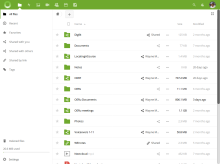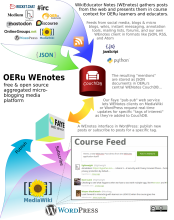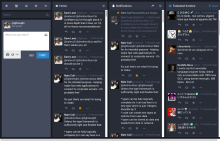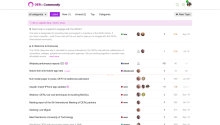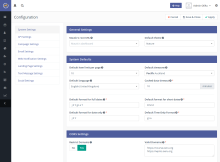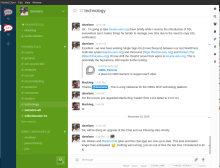Hourly versioned MongoDB backup
Because the collaboration of an open community is its real history, I place a high value on backing up the Rocket.Chat servers I'm responsible for, and especially the data they generate, held in MongoDB files (on the host) managed by a MongoDB container.
To do that reliably, I have set up a bash script which does an hourly backup of all MongoDB "databases" and automatically maintains 24 hourly, 7 daily, 4 weekly, 12 monthly, and 7 yearly snapshots of the databases.
Upgrading RocketChat to 1.0.x and MongoDB to 4.0
With the recent release of Rocket.Chat 1.0.x (after a couple years undergoing development at a fairly blistering pace), it's time for many of us to upgrade!
Previously, I showed how to install Rocket.Chat via Docker Compose but that was a much earlier version of Rocket.Chat and version 3.4 of MongoDB, which is now quite old (by FOSS standards at least). And it turns out upgrading everything has a few gotchas, so here's how I managed to do it.
Installing NextCloud and Collabora Office Online with Docker on Ubuntu 16.04
Update 2021-11-08: this post is now getting a bit long-in-the-tooth, and I need to update it to use up-to-date components. It might still be useful to folks, but use it with caution. Also, please note, we're using NextCloud with OnlyOffice (the open source community edition) these days. Update 2023-06-14: Here's a new tutorial for Ubuntu 22.04!
WikiEducator Notes: OERu's course feed aggregation and messaging system
Here at the OERu, we provide a service, attached to all of our online courses (and available to all of our partners - or anyone else for that matter) which allows anyone involved in those courses to communicate with their peers from any one of a dazzling array of online "places" with WikiEducator Notes (aka WEnotes). The entire system is free and open source software (FOSS).
Installing Mastodon with Docker-Compose on Ubuntu 16.04
Not long ago, Mastodon, an open source, federated alternative to the proprietary network-effect wunderkind, Twitter, came out of no where.
Docker Compose: A better way to deploy Rocketchat, Wekan, and MongoDB
A few months back, I posted instructions on deploying Rocket.Chat and Wekan instances (and their mutual dependency, MongoDB) individually. Since then, I've spent some time with Docker Compose, a set of scripts which help you to define, build, and manage a set of Docker containers. Docker Compose is a thing of beauty. This is the way I now deploy Rocket.Chat, Wekan, and MongoDB together.
Many simple tools, loosely coupled
Our approach to technology here at the OERu is inspired by the UNIX tool philosophy which can be summarised as follows:
"create simple tools that do one job well, and make it easy to combine them to work together"
Multiple Discourse Forums on the same server
At the OERu we have two separate instances of market category leading Discourse Forum: one for OER partner and contributor collaborators and the other for learners. These days, online forums are seen as a bit old-school: fuddy-duddy. From my point of view, however, Discourse is "Forum-NG" (a Next Generation forum).
Installing Mautic with PHP7-FPM on Docker, Nginx, and MariaDB on Ubuntu 16.04
Mautic is an open source marketing automation web application.
Installing Rocket.Chat with Docker on Ubuntu Linux 14.04
Rocket.Chat is a modern, open source messaging application which is functionally similar to a popular (and heavily marketed) proprietary tool called Slack.

